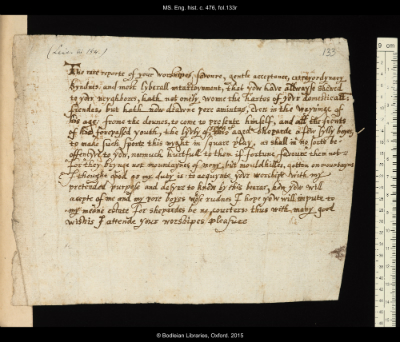Play of the Saxons: Difference between revisions
| Line 7: | Line 7: | ||
In his entry for 25 March 1620 (i.e. 1621) -- 26 March 1621, Philip Powell records the following anecdote about a playgoer responding to a line delivered by a player:<br> | In his entry for 25 March 1620 (i.e. 1621) -- 26 March 1621, Philip Powell records the following anecdote about a playgoer responding to a line delivered by a player:<br> | ||
[[image:Bodleian MS Eng hist c 476 fol 133r - thumb.jpg|link=https://www.lostplays.org/images/0/04/Cardiff_Central_Library_MS_3_42.JPG]]<br> | |||
<br> | <br> | ||
Revision as of 19:45, 27 March 2017
Anon. (1617?)
NB. "Play of the Saxons" is a recent assignation (from Wiggins 1817) for this untitled play. The name is used here for convenience.
Historical Records
Philip Powell of Brecon's commonplace book (Cardiff County Library MS 3.42)
In his entry for 25 March 1620 (i.e. 1621) -- 26 March 1621, Philip Powell records the following anecdote about a playgoer responding to a line delivered by a player:

- Cardiff Central Library MS 3.42. Philip Powell's commonplace book, p.139, courtesy of Cardiff Libraries.
1620 ii
on Kendal a foole in a stage play in Bristoll being m˹e˺erie acctinge the part of the vize, spake extempore as foloweth, in dispraise of the noble Brittans,
if thou art a Brittane borne, it fitts thee to were ye horne
Iohn Brittan a prentiz of on Thomas Dean of Bristoll his re-ply to Kendall: twise: as foloweth:
A Brittans name I truly beare, I leaue the horne for the ˹^to were:˺
the horne becomes the saxons best
I kisd thy wife supose the rest:
...
[Marginal note: "(R) Kendall the Saxon put to silence:"]
Theatrical Provenance
Performed by an unknown company at Bristol. Powell names the player in the role of Vice as one "Kendall", which may refer to William Kendall (Admiral's/Palsgrave's company) or Richard Kendall (King's Revels company). Wiggins (1817) notes that the Palsgrave's Men visited Bristol for the only time in late 1617, and tentatively suggests this as the most likely auspices of the performance in question. This would make the anecdote an old one, being recollected some three or four years later. The alternative is that the anecdote was recent, in which case it may derive instead (as Wiggins suggests) from a performance by Lady Elizabeth's Men in Bristol between 30 September and 25 December 1620. (But in that case, the identity of Kendall remains unsolved).
Probable Genre(s)
History (?) (Wiggins)
Possible Narrative and Dramatic Sources or Analogues
Inasmuch as it cannot be said with any certainty whether Kendall's character literally had a horned Saxon helmet or whether he was simply referring to one, we technically can't be sure that the play even featured Saxons and Britons. It may simply have been a throwaway line from an otherwise unrelated play, rather than being a play concerned with the Saxon invasion (though this, too, does remain a possibility). The presence of a Vice character complicates any straightforward identification of the play as 'history'.
References to the Play
Only Powell's anecdote (see Historical Records above.
Critical Commentary
Preiss, drawing attention to the use of the word "twice", notes that "So total is the confounding, indeed, that Brittan repeats his zinger 'twise' -- perhaps in exultation, or perhaps because he really wants to hear the comeback, and refuses to let the over-matched clown off the hook" (92).
Wiggins (1817) appears to be the only other scholar to comment on this play since the relevant excerpt from Powell's commonplace book was published in REED: Bristol.
For What It's Worth
Wiggins notes that William Kendall "seems to have been known for his facility with witty improvisation... If he was the Kendall performing at Bristol, then part of the point of the anecdote is that he was bested in his own speciality by a member of the audience" (1817).
Works Cited
Site created and maintained by David McInnis, University of Melbourne; updated 17 March 2017.